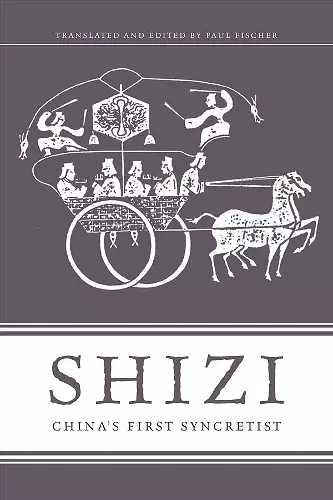Shizi
China's First Syncretist
Format:Hardback
Publisher:Columbia University Press
Published:10th Jul '12
Currently unavailable, and unfortunately no date known when it will be back

This study and translation of the Shizi is an important contribution to the field of early Chinese history. It calls attention to, and makes accessible, a text that has been neglected and overlooked in scholarship on the pre-Qin period. -- John S. Major, Senior Lecturer, China Institute, and cotranslator and coeditor of The Huainanzi
By blending multiple strands of thought into one ideology, Chinese Syncretists of the pre-imperial period created an essential guide to contemporary ideas about self, society, and government. Merging traditions such as Ruism, Mohism, Daoism, Legalism, and Yin-Yang naturalism into their work, Syncretists created an integrated intellectual approach that contrasts with other, more specific philosophies. Presenting the first full English translation of the earliest example of a Syncretist text, this volume introduces Western scholars to both the brilliance of the syncretic method and a critical work of Chinese leadership. Written by Shi Jiao, China's first syncretic thinker, during the Warring States Period of 481 to 221 BCE, Shizi is similar to Machiavelli's The Prince in that it dispenses wisdom to would-be rulers. It stresses the need for leaders to be detached and objective. It further encourages self-cultivation and effective government, recommending that rulers maintain self-discipline, hire reliable people, delegate power transparently, and promote others in an orderly fashion. The people, it is argued, will emulate their leader's wisdom and virtue, and a just and peaceful state will result. Paul Fischer provides an extensive introduction and a chapter-by-chapter summary and analysis of the text-outlining the importance of syncretism in Chinese culture-and explores the text's particular features, authorship, transmission, loss, and reconstruction over time. The Shizi set the stage for a long history of syncretic endeavor in China, and its study provides insight into the vital traditions of early Chinese philosophy. It is also a template for interpreting other well-known works, such as the Confucian Analects, the Daoist Laozi, the Mohist Mozi, and the Legalist Shang jun shu.
Paul Fischer's translation of Shizi shows us that the world of thought in ancient China is a vast space, like a starry sky, and the famous thinkers such as Kongzi, Mozi, and Laozi are only the brightest of so many stars. Fischer provides a way to find many forgotten thinkers that should be reexamined, as in fact they are treasure boxes of knowledge. -- Li Ling, Peking University A very useful book for anyone working on early Chinese thought. -- Carine Defoort Monumenta Serica ... [Paul] Fischer's study, translation, and annotation of Shizi is wholeheartedly to be welcomed as a sound and carefully produced scholarly achievement. Archiv Orientalni Fischer argues robustly for the historical and literary value of the Shizi... he has produced a very readable bilingual manuscript, facilitating easy comparison of the English translation to the original text. Philosophy East and West Fischer has completed an excellent job of reconstructing the history behind the life and times of Master Shi and the transmission of extant fragments. His translation is fluid and easy to read... A welcome addition to the translations and interpretatios of ancient pre-Qin philosophical literature. China Review International
ISBN: 9780231159067
Dimensions: unknown
Weight: unknown
256 pages